Dubsado alternatives offer varied features and pricing to suit different business needs in 2026. Key options include Bonsai, Agency Handy, and 17hats, each providing unique tools for client management and project workflows.
Bonsai, for instance, is user-friendly and ideal for small business owners, while Agency Handy offers robust project tracking capabilities.
Choosing the right platform depends on specific requirements like contract management, invoicing, and automation needs. Evaluate free trials and pricing plans to make an informed decision.
These alternatives can enhance productivity and streamline operations for freelancers and agencies alike.
Are you searching for the right client management and project management platform to draft contract templates and manage your solo business? As with choosing any other work tool, it takes time - and thorough research - to find what would suit your needs in the best possible way.
Dubsado is one of the most popular business management platforms on the market. It boasts several useful features that help professionals handle client relationships, contracts, invoicing, and workflows.
While it's a solid project management software, it may not be the best fit for your freelance business. Many other platforms offer different combinations of features at different prices that are great Dubsado alternatives, and you should know about them!
In this list, you can find 10 great Dubsado alternatives which might be the right solution for your needs.
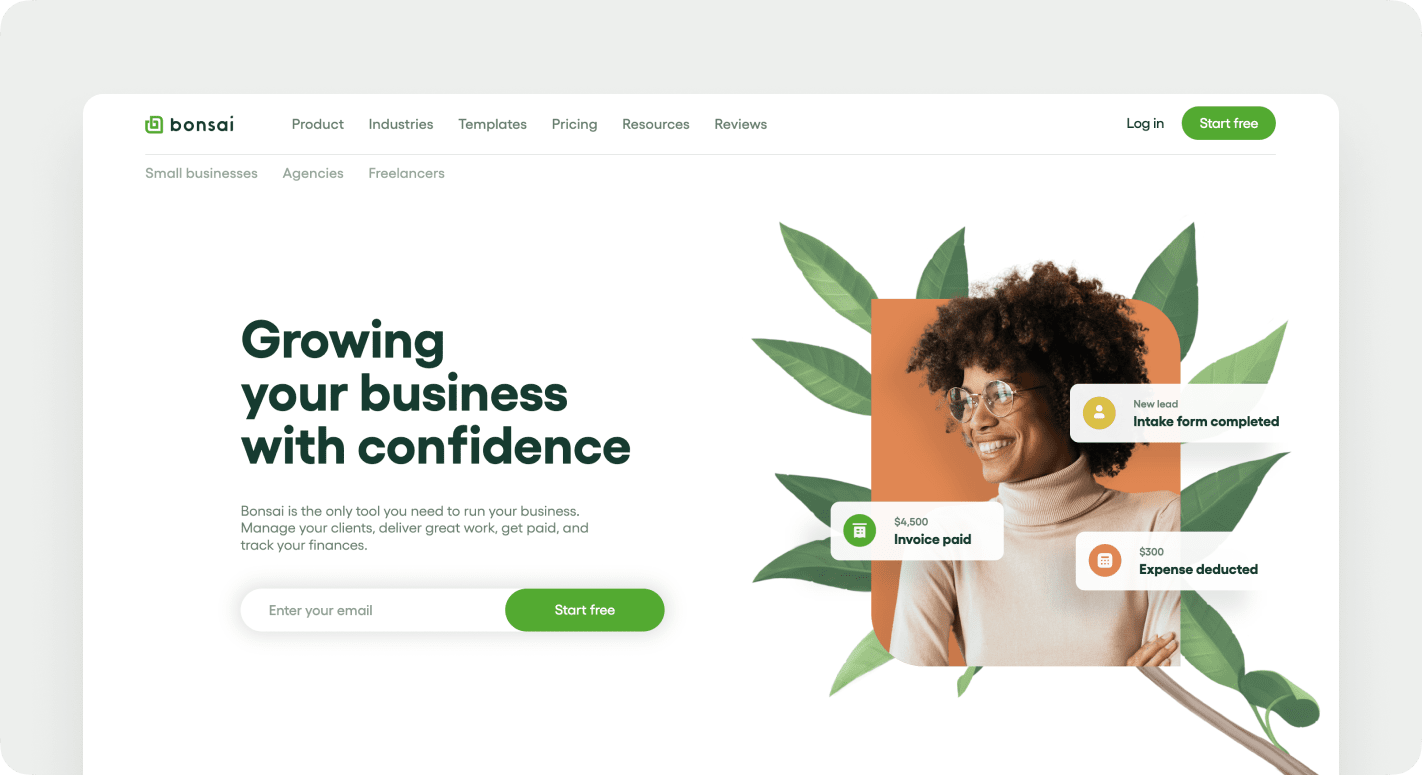
#1. Bonsai
Bonsai is an all-in-one product suite for agencies and small business owners that is user-friendly and offers all the tools you’ll need at an affordable price, making it the best option among Dubsado alternatives.
It helps you tackle all the tasks of running a business, such as sending proposals or contracts, lead management, project management, invoicing, expense tracking, and client management.
You can easily prepare and send proposals and contracts using the 500+ ready-to-use templates and handle client relations and keep track of all your projects in one place.
Bonsai also boasts several other useful features, such as an online signature maker, time tracking, scheduling, and a digital business account.
The platform can help you get a hold of your accounting needs and taxes as well. It is available in 180 countries, so you don't need to worry about working internationally. Also, Bonsai has been trusted by 500,000+ freelancers and agencies, so you are in good hands! Sign up for a Free Trial today!
Key Features
- Client CRM
- Easy customizable templates (proposals, contracts, forms, quotes, etc.)
- Project Management
- Automate recurring invoices
- Invoice reminders
- Time tracking
- Client Portal
- User-friendly interface
- Task management and project management
- Integrated scheduling
Pricing
- Starter: $25 /month
- Professional: $39 /month
- Business: $79 /month
-
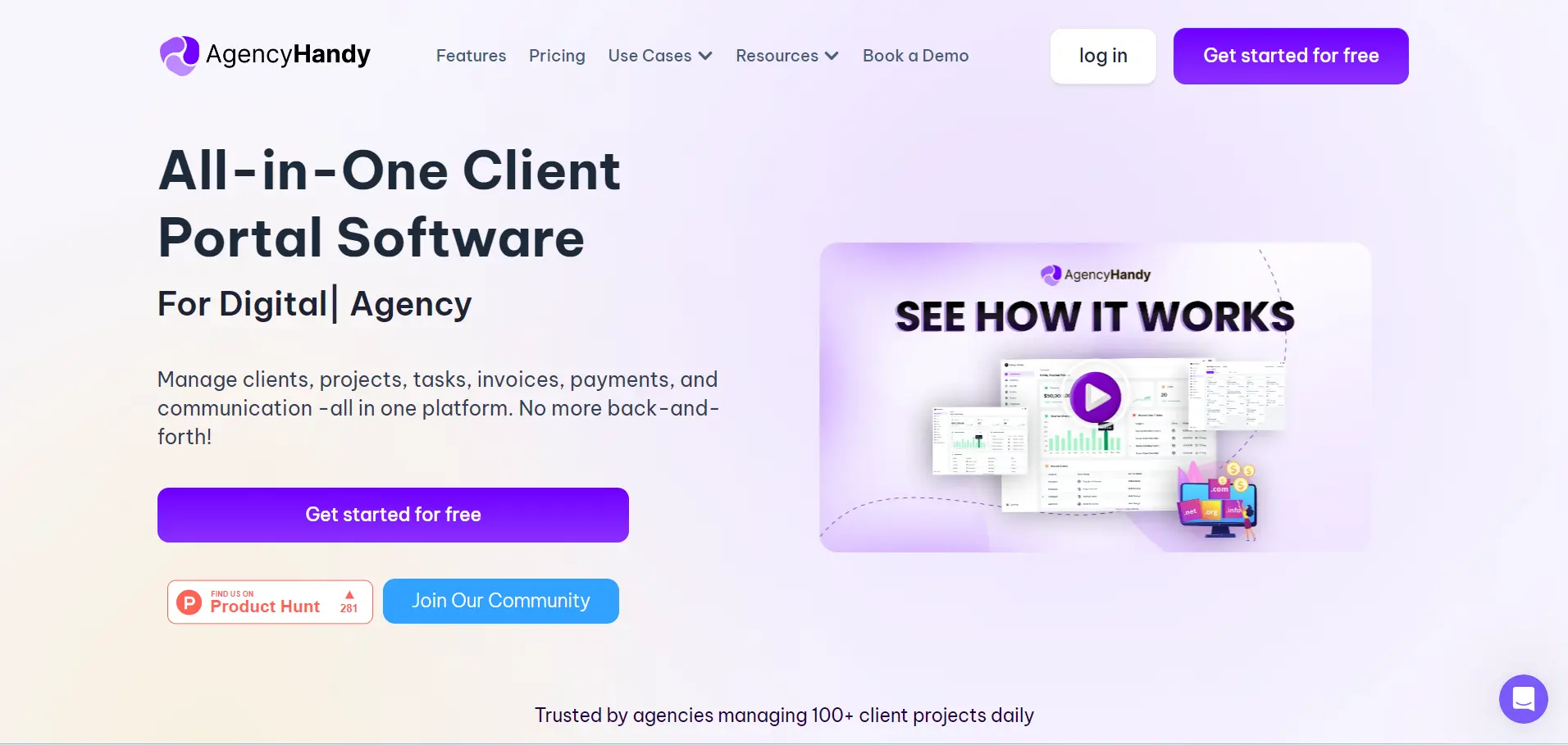
#2. Agency Handy
Agency Handy is an excellent Dubsado alternative designed for digital agencies to handle everything in one place—showcase services, proposals, client management, and invoicing. With a customizable multipackage service catalog, you can let your clients choose and checkout accordingly.
Besides, you can utilize intake forms to collect necessary client details and order forms to get project details from the get-go. In addition, you can choose to upsell services or add-on to the order form for added value.
The invoicing system is designed with ease in mind. You have options for split payments, support for multiple currencies, and integrations with Stripe, PayPal, and Wise, making payments straightforward for everyone involved.
Key Features
- Embeddable service catalog in website
- Flexible intake and order forms for client onboarding
- Order and task tracking with Kanban boards
- Client approval and feedback on tasks
- Automated invoice reminders and recurring billing
- Customizable white labeling and email templates
- Payment integrations (Stripe, PayPal, Wise, manual banking)
Pricing
- Solopreneur: $49 /month
- Teams: $99 /month
- Pro: $149 /month

#3. 17hats
17hats is a business management tool with a robust CRM tool for project-based solopreneurs or small business owners. It helps you with client management, sales pipelining, scheduling, and bookkeeping, as well as organizing and systematizing your work professionally.
17hats has features from lead inquiry forms and client questionnaires to proposals, contracts, and invoicing.
It offers time-tracking, to-do lists, and workflows. It also integrates with Google Calendar, Apple Calendar, QuickBooks, and more, helping you centralize your work in one place.
Key Features
- Client management system
- Automation workflow
- Custom mapping for questionnaires
- A wide range of integrations
- User-friendly interface
- Customizable templates
- Client portal
- Project Management software
Pricing
- Essential package: $15 /month
- Standard package: $30 /month
- Premier package: $60 /month

#4. Bitrix24
Bitrix24 is another collaboration and CRM platform that's one of the most popular Dubsado alternatives. It offers a dedicated solution for solo and small businesses to effortlessly organize and streamline their business process for free, which makes it one of the best free alternatives to Dubsado.
Bitrix24 is a project management solution with features such as real-time communication, client interaction management, a client portal, document management, and task management. Handle invoicing directly from the CRM and benefit from other features like time management capabilities, to-do lists, and task dependencies.
Key Features
- Collaboration and communication
- Task management and project management
- Lead and marketing generation
- Workflow automation
- Kanban board interface
- Online invoicing and payments
Pricing
- Free (almost all features included)
- Basic: $49 /month
- Standard: $99 /month
- Professional: $199 /month
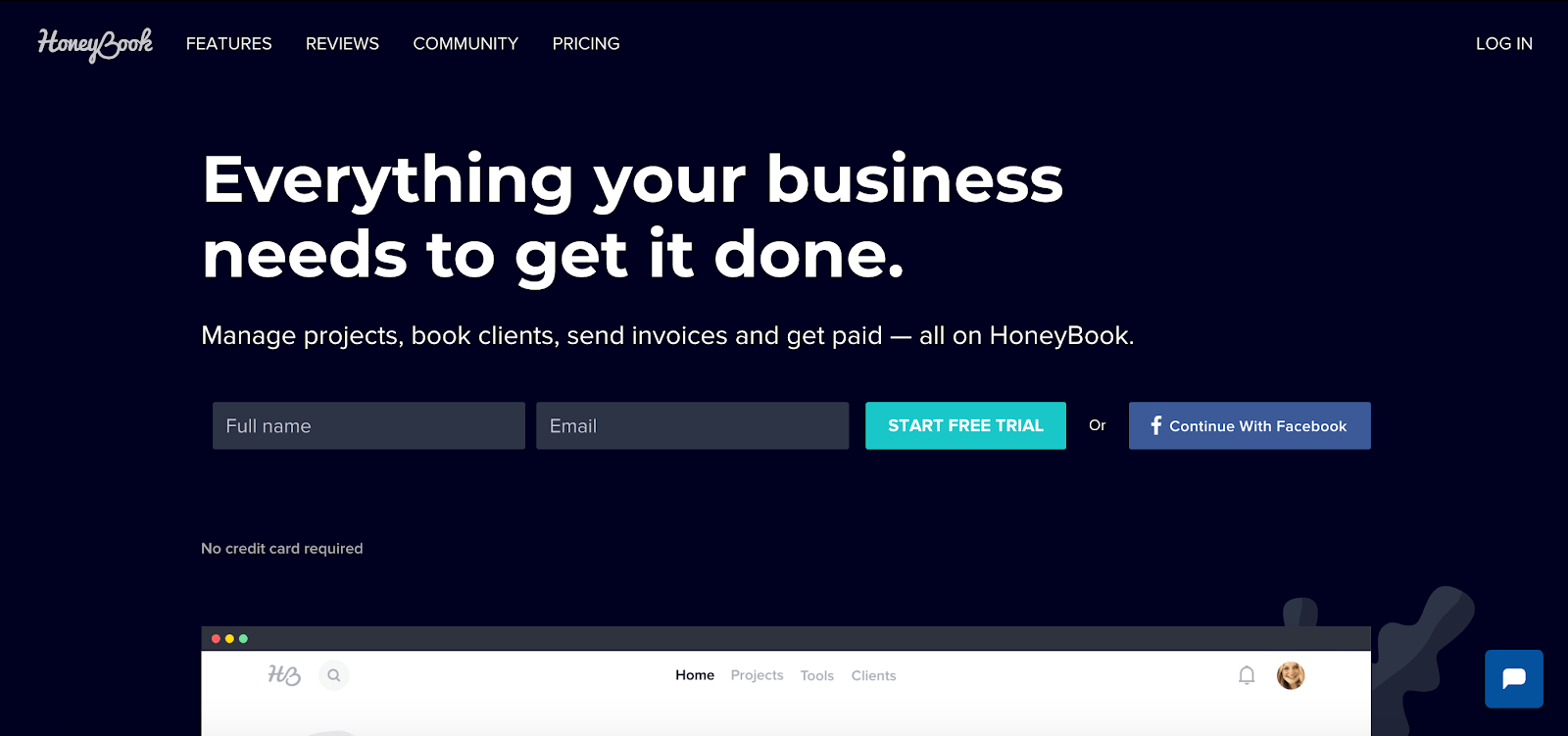
#5. HoneyBook
HoneyBook is essentially a client management software for small businesses and freelancers. It provides tools for invoicing, contracts, and scheduling, making it one of the best Dubsado alternatives.
HoneyBook's features are similar to those of Dubsado. These include preparing and sending proposals and contracts, scheduling, project management structure, and integrating elements of finance, marketing automation, and communication.
HoneyBook lets you overview your projects, manage documents, and communicate with clients all in one place. You can easily set up workflow automation to save time on repetitive tasks and ensure great customer communication. It also allows seamless integration with tools like QuickBooks and offers a free trial.
Key Features
- Good CRM platform
- Workflow automation
- Seamless integration
- Online payments, invoices, and tax assistant
- Easy contract and proposals
- Good schedule management
- Client portal
Pricing
- Starter: $19 /month
- Essentials: $39 /month
- Premium: $79 /month
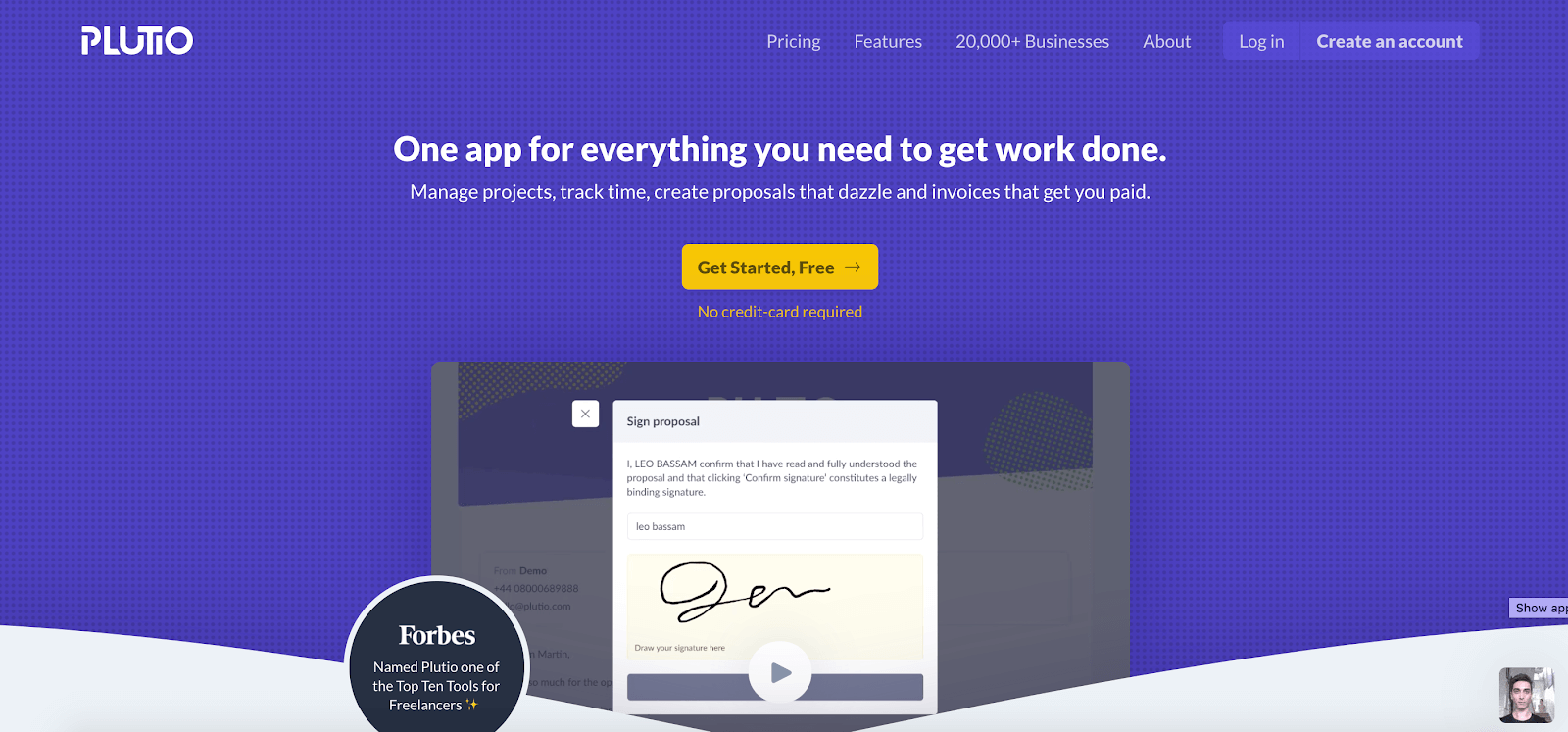
#6. Plutio
Plutio is a complete toolkit dedicated specifically to the freelance industry and helps solo professionals handle the chaos of work. It helps create and send proposals and contracts to clients, invoicing and payments, automated workflows, and centralized communications with your clients.
Plutio supports effortless customization for professional branding and workspace to fit your business needs. It's an all-around solution with many CRM features, including time tracking, task management, project overview, and email sync.
Key Features
- Client CRM management
- Workspace customization
- Time tracking
- Task and project management
- Ready-to-use templates
- Online invoicing and payments
- Hassle-free scheduling
Pricing
- Solo: $19 /month
- Studio: $39 /month
- Agency: $99 /month
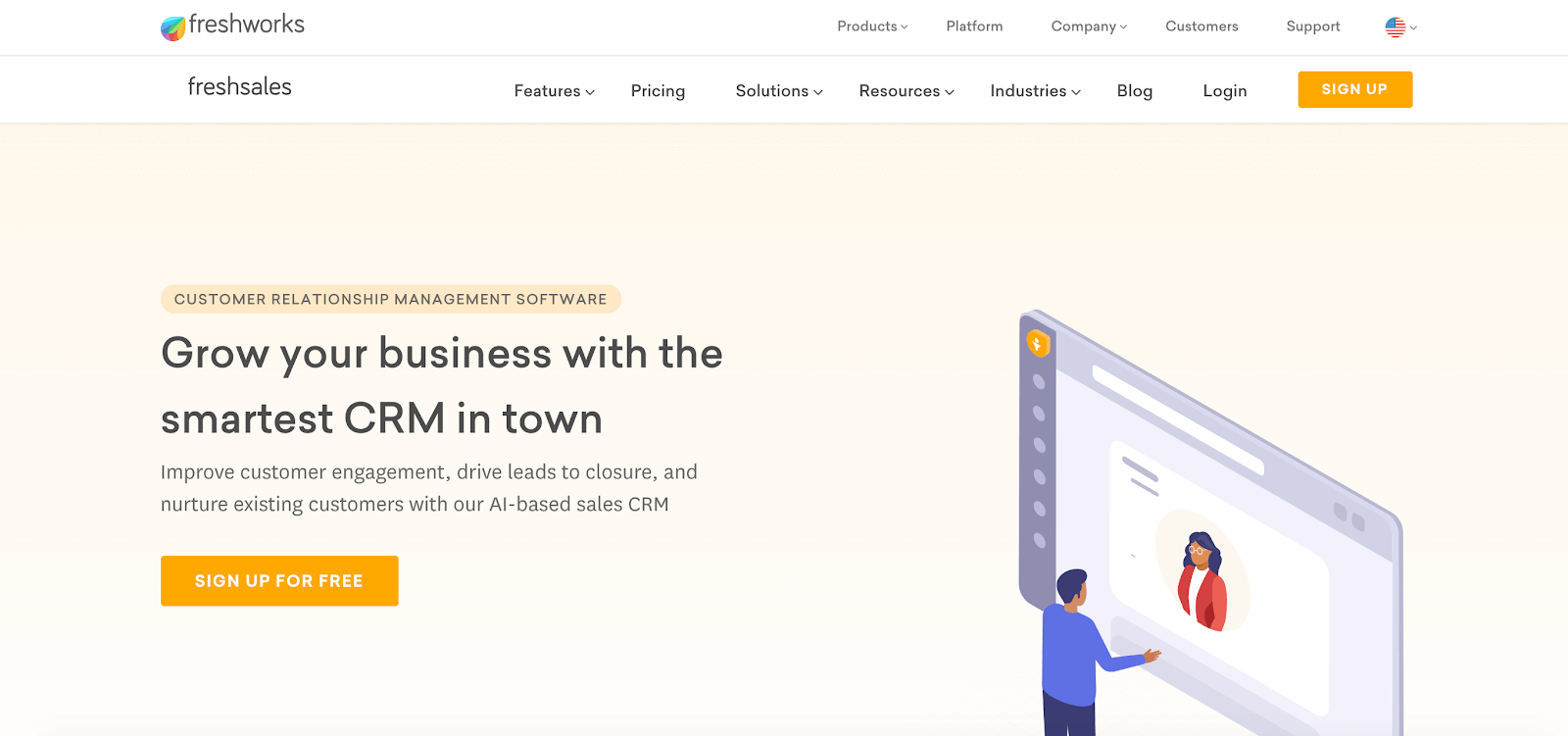
#7. Freshsales
Freshsales is the sales CRM of Freshworks, specifically designed to help customer relationship building and organization. The software offers a more in-depth feature set that includes lead and deal management, event tracking, and email integration, even in their free version, making it among the best free alternatives to Dubsado.
Freshsales also provides in-depth sales analytics reports, workflow automation, and sales intelligence features. Moreover, the software is available in over 30 languages and supports multiple currencies.
Key Features
- Smart and easy CRM management
- Proactive AI assistant
- Kanban-style workspace
- Automated workflow
- Advanced in-depth analytics
- Various integrations for better functionality
- Supports multiple languages and currencies
Pricing
- Free (up to 3 users)
- Growth: $15 /month
- Pro: $39 /month
- Enterprise: $69 /month

#8. Salesmate
Salesmate is as centralized as a sales CRM platform, and one of its popular applications is for freelancers and small businesses. It focuses on marketing, which helps accelerate sales and improve your productivity.
It has rich features, such as a sales pipeline and built-in practical communication tools like email tracking and text messaging. It also helps automate your workflows and offers several integrations, making it one of the best dubsado alternatives.
Key Features
- Client CRM management
- Sales pipelines
- Marketing management
- Lead nurturing
- Schedule management
- Customizations and integrations
Pricing
- Basic: $29 per user/ month
- Pro: $49 per user/ month
- Business: $79 per user/ month
- Enterprise: (custom price based on the needs)

#9. Releventful
Releventful is a CRM software designed for professionals in event management. Its features simplify customer connection, automate your workflows, and allow a better overview of processes.
The software allows you to manage sales and costs, scheduling, contracts, billing, and invoicing—all in one place. Releventful also provides inventory management and business reports.
Key Features
- Seamless event management
- Client CRM management
- Schedule management
- Billing and invoicing
- Costs and sales management
- Inventory management
- Allows integrations
Pricing
- Entrepreneur: $90 /month
- Professional: $120 /month
- Business: $260 /month

#10. Bloom
Bloom is a CRM and business management software designed specifically for creative individuals. Its goal is to provide better assistance for creative professionals to handle administrative tasks without sacrificing time from their real jobs.
Bloom offers tailored tools that help with lead capturing, client relations, proposals, and contracts. It also lets you set up and automate your workflows, invoicing, and payments as well as track your leads and contracts. These features help you run your business efficiently.
Key Features
- Client CRM management
- Workflow automation
- Time tracking
- Project management
- Scheduling and website portfolio
- Invoicing and contract
Pricing
- Starter: $17 /month
- Standard: $37 /month
- Full-service: (custom price based on the needs)

#11. Studio Ninja
Studio Ninja is another platform with specifically designed software for photographers, which can also come in handy for other creative professionals. The features of the software are tailored to meet the needs of creative individuals.
The software offers tools like lead management, job tracking, quotes and contracts, payment, and analytics. It allows you to automate your workflows and many administrative tasks. Studio Ninja also supports several integrations with popular work tools, helping you run your business efficiently.
Key Features
- CRM management
- Workflow automation
- Online booking and scheduling
- Invoicing and contract
Pricing
- Pro: $24.90 /month
- Master: $36.50 /month
#12 VCITA
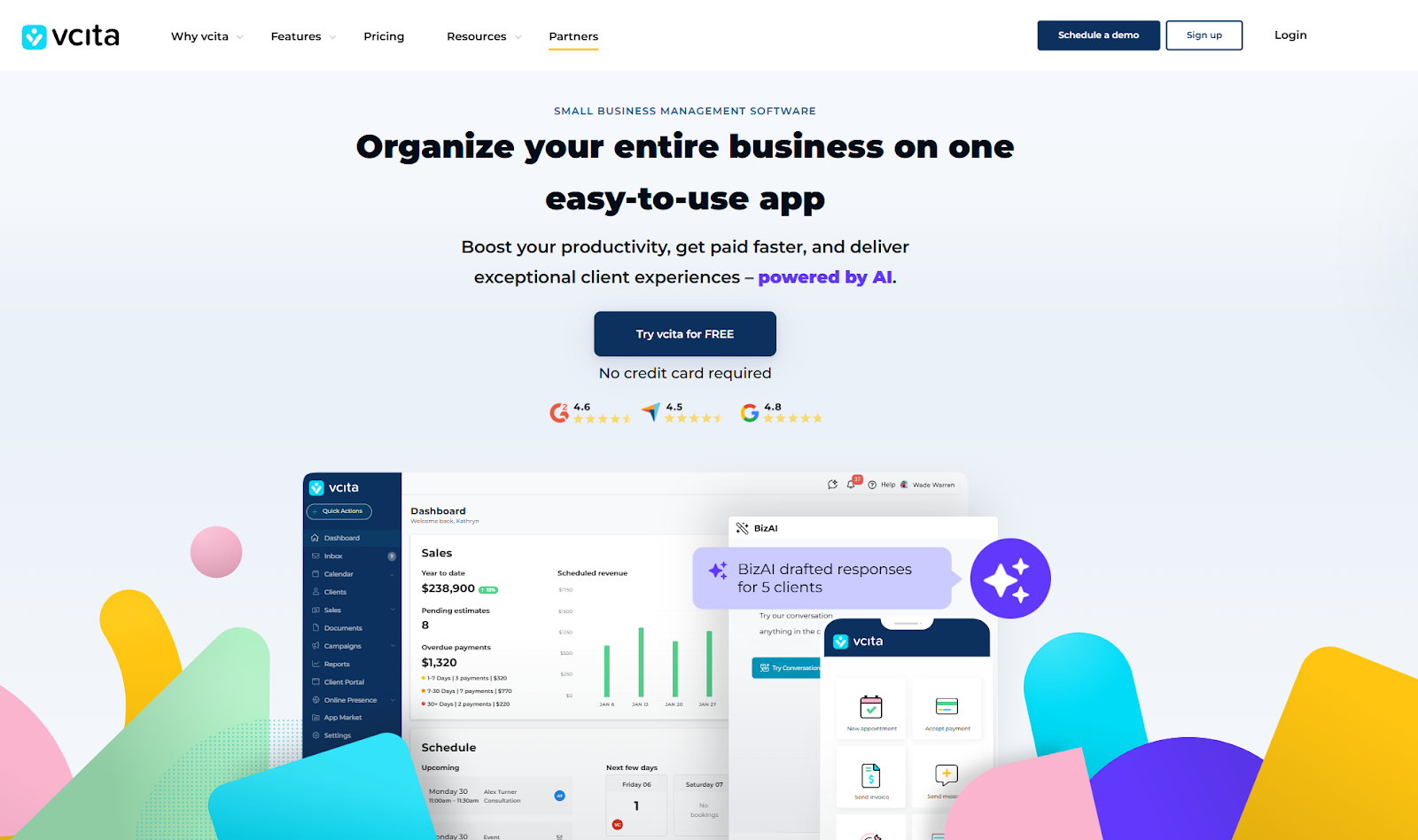
vcita is an all-in-one platform for service-based SMBs that bundles CRM, online scheduling, invoicing/payments, a branded client portal, and BizAI, an embedded assistant that drafts replies, proposes meeting times, builds estimates, and surfaces actionable insights. vcita centralizes client data and daily workflows so you can book faster, get paid sooner, and keep every conversation in one place. It’s simple enough for solo pros yet powerful for growing teams, with mobile apps and integrations that slot neatly into the stack you already use. vcita is a good alternative to dubsado thanks to its native client portal, robust scheduling, and AI features available on every plan.
Features
- BizAI automation (reply drafts, scheduling, estimates, insights).
- CRM & client records (custom fields, forms, documents, tags, statuses, reports).
- Online scheduling with automated reminders and calendar sync.
- Invoices & payments including deposits, recurring payments, and billing automation.
- Branded client portal so clients can book, pay, message, and access docs 24/7.
- Marketing tools for email/SMS campaigns and automated follow-ups.
Pricing
- Kickstart: $29/mo
- Business: $54/mo
- Platinum: $93/mo
All plans include a 14-day free trial.
What exactly is Dubsado?
Dubsado as a client management system
Dubsado is a client management system designed to help freelancers and small business owners streamline their workflows. It combines tools for contracts, invoicing, scheduling, and project management into one platform. This integration reduces the need to switch between multiple apps, saving time and minimizing errors.
For example, a photographer can use Dubsado to send contracts, collect deposits, schedule sessions, and invoice clients all from a single dashboard. This centralized approach helps maintain professionalism and keeps client information organized.
To get started with Dubsado, users typically set up templates for emails, contracts, and invoices, which can then be customized per client. This automation speeds up repetitive tasks and improves client communication.
Key features that define Dubsado
Dubsado’s key features include:
- Customizable workflows
- Automated reminders
- Client portal
These tools help freelancers manage multiple projects and deadlines efficiently. For instance, automated reminders can notify clients about upcoming payments or meetings, reducing no-shows and late payments.
The client portal allows clients to view contracts, invoices, and project updates in one place, enhancing transparency and trust. Additionally, Dubsado supports online payments through integrations with Stripe and PayPal, enabling faster payment processing.
Understanding these features helps freelancers decide if Dubsado fits their business needs before exploring alternatives that might offer different pricing or specialized tools.
Who should consider using Dubsado?
Dubsado is best suited for freelancers and small business owners who want an all-in-one solution for client management. Creative professionals like designers, photographers, and consultants often find Dubsado’s features align well with their workflow needs.
However, businesses with very simple needs or those looking for lower-cost options might explore alternatives. Dubsado’s monthly plans start at $40 as of 2024, which might be a consideration for those just starting out or with fewer clients.
Before choosing Dubsado, evaluate your business size, budget, and the specific features you require. This ensures you select a tool that supports growth without unnecessary complexity or cost.
Common downsides of Dubsado
Complexity for new users
Dubsado can feel overwhelming for freelancers and small business owners who are new to client management software. Its wide range of features, including contracts, invoicing, and workflows, requires a steep learning curve. Setting it up effectively may take several hours or even days to configure the system to fit specific needs.
For example, setting up automated workflows in Dubsado involves multiple steps that can confuse users unfamiliar with automation logic. This complexity can delay onboarding new clients and slow down daily operations. Many users find themselves relying heavily on tutorials or customer support during the initial phase.
To overcome this, start by focusing on the core features you need most, such as invoicing or contract templates. Gradually build out workflows as you become more comfortable. Using Dubsado’s community forums and video tutorials can also speed up the learning process and reduce frustration.
Limited customization options
Dubsado offers some customization but can be restrictive when tailoring client-facing documents and forms. For freelancers who want to maintain a unique brand identity, the available templates and design options sometimes fall short. This limitation affects proposals, contracts, and client portals, which may look similar across different users.
For instance, Dubsado’s form builder does not support advanced styling or embedding custom CSS, which means you cannot fully control the visual layout or responsiveness on mobile devices. This can be a drawback for businesses aiming for a polished, branded client experience.
To address this, consider integrating Dubsado with external tools like Canva for designing documents or using Zapier to connect with other platforms that offer more design flexibility. This hybrid approach allows you to maintain brand consistency while still benefiting from Dubsado’s automation features.
Pricing structure and scalability
Dubsado’s pricing model may not suit all freelancers or small businesses, especially those just starting out. The platform charges a flat monthly fee starting at $40 for unlimited clients, which can feel expensive compared to competitors offering tiered plans based on usage or features in 2024.
Additionally, while Dubsado includes many features in one package, some users find that they pay for functionalities they don’t need, making it less cost-effective. For example, a solo freelancer who only needs invoicing and client management might find more affordable options like HoneyBook or Bonsai.
To manage costs, evaluate your essential features before committing. Many Dubsado alternatives offer free trials or lower-tier plans that scale with your business growth. Testing these options helps ensure you’re investing in a tool that fits both your workflow and budget in 2024.
What should you look for in a dubsado alternative?
Here are some features you should look for when searching for Dubsado alternatives:
- Client management
- Invoicing
- Automation workflows
- Contract templates
- Payment integrations
- Time tracking
- A client portal for tracking client-specific tasks and projects; this includes client contact details and conversation history.
- A feature to handle contracts and projects that allows you to create tasks, set deadlines, and track task progress to ensure timely project completion.
- Workflow automation to automate repetitive tasks, freeing up your time to focus on more important tasks.
- Adequate customization options that are flexible enough to adapt to your team's workflows.
- It must be user-friendly so it's not hard to navigate around, else it can hinder your productivity.
- Integration capabilities with other tools you're already using improve your and your team's productivity.
- And lastly, it should be affordable while providing all the functionalities you need to run your business.
Free trials and risk-free offers for Dubsado alternatives
Why free trials matter when choosing a Dubsado alternative
Free trials are essential for freelancers and small business owners to test Dubsado alternatives without financial commitment. They allow users to explore features like client management, invoicing, and automation firsthand, ensuring the software fits their workflow. This hands-on experience reduces the risk of investing in a tool that might not meet specific business needs.
For example, HoneyBook offers a 7-day free trial that lets users create projects, send proposals, and manage payments. Similarly, 17hats provides a 14-day trial period, giving ample time to evaluate its CRM and contract tools. These trials help users compare usability and functionality before making a subscription decision.
To make the most of free trials, set clear goals such as testing client onboarding or invoice creation. Document your experience and compare it against your current process. This approach ensures you select a Dubsado alternative that genuinely improves your business operations.
How to leverage risk-free offers to maximize your evaluation
Risk-free offers, including money-back guarantees and extended trial periods, provide additional security when switching from Dubsado. These offers let you explore the software beyond the initial trial without pressure, ensuring you don’t lose money if the tool isn’t a perfect fit.
For instance, Bonsai offers a 14-day free trial plus a 30-day money-back guarantee on paid plans. This combination allows users to test features like contract templates and time tracking thoroughly. Similarly, And.co provides a 7-day trial with no credit card required, reducing signup friction and encouraging exploration.
To benefit from these offers, start by using the trial to test core features, then consider upgrading to a paid plan knowing you can cancel within the guarantee period. Keep track of your experience during this time to decide confidently whether to continue or switch tools.
Tips for choosing the best free trial among Dubsado alternatives
When selecting a free trial, prioritize those that offer full access to key features rather than limited versions. This ensures you can evaluate the software’s true capabilities, such as automation workflows, client portals, and payment integrations. For example, 17hats’ trial includes access to all features, giving a comprehensive overview.
Also, check the trial length and cancellation policies. Longer trials like Bonsai’s 14-day period provide more time to experiment with complex tasks, while easy cancellation processes prevent unexpected charges. Some platforms, like HoneyBook, require credit card details upfront, so be mindful of automatic billing after the trial ends.
Finally, prepare a checklist of must-have features before starting the trial. Use this list to test each alternative systematically, comparing results to your current system. This methodical approach helps identify the best Dubsado alternative that aligns with your business goals and budget.
Why bonsai is the best dubsado alternative?
Considering the above points, Bonsai can be your best Dubsado alternative.
It can help create and track contracts, proposals, and all documents associated with your contract. The software also offers an e-signature tool that allows clients to sign contracts electronically, as well as easy customization to make your business look more personalized and professional. You can also enjoy seamless integration with Bonsai.
In addition to that, you can track your projects, time, and expenses, which makes it easier to run the business without worrying about minor details. Bonsai also enables simplified invoicing and payment processing, allowing you to accept payments from clients directly within the platform. Another feature of Bonsai is workflow automation, which automates repetitive tasks and streamlines your workflow.
Bonsai offers all the above features at a reasonable price of $25 to $79 per month. Sign up for a free trial today!
Why try dubsado alternatives?
Do you want to get started with Bonsai, the best Dubsado alternative? You can sign up for a free trial - no strings attached - and explore the powers of Bonsai to transform how you run your business.






